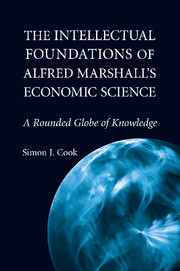Book contents
- Frontmatter
- Contents
- Acknowledgments
- List of Abbreviations
- Introduction
- PART I THE CONTEXTS OF MARSHALL'S INTELLECTUAL APPRENTICESHIP
- 1 Continuity and Consensus: The State of Long-Term Memories
- 2 A Liberal Education
- PART II DUALIST MORAL SCIENCE: 1867–1871
- PART III NEO-HEGELIAN POLITICAL ECONOMY: 1872–1873
- EPILOGUE: “A ROUNDED GLOBE OF KNOWLEDGE”
- Bibliography
- Index
- Titles in the series
1 - Continuity and Consensus: The State of Long-Term Memories
Published online by Cambridge University Press: 25 October 2009
- Frontmatter
- Contents
- Acknowledgments
- List of Abbreviations
- Introduction
- PART I THE CONTEXTS OF MARSHALL'S INTELLECTUAL APPRENTICESHIP
- 1 Continuity and Consensus: The State of Long-Term Memories
- 2 A Liberal Education
- PART II DUALIST MORAL SCIENCE: 1867–1871
- PART III NEO-HEGELIAN POLITICAL ECONOMY: 1872–1873
- EPILOGUE: “A ROUNDED GLOBE OF KNOWLEDGE”
- Bibliography
- Index
- Titles in the series
Summary
INTRODUCTION
Although economists continue to discuss many of Marshall's economic ideas, core elements of his early economic thought, not to mention its metaphysical, historical, and psychological grounds, have disappeared from view over the course of a little more than a century. This collective amnesia is related to the fact that key contexts of Marshall's thought – such as the struggle for cultural authority at a moment of Anglican disestablishment – have by now passed beyond our cultural horizons. But it is also an illustration of the fact that a society remembers its past selectively. The Victorians lost sight of the particularities of eighteenth-century political and intellectual life as a whole, and indeed consistently and systematically misinterpreted Adam Smith. But just as in the twentieth century, where the various constructions of the history of political economy served divergent disciplinary and wider polemical purposes, so Victorian formulations of this history were the product of nineteenth-century intellectual and political developments. This chapter points to a number of those developments in order to provide a context for our subsequent investigation of Marshall's early intellectual life. It explores these developments by way of a discussion of some of the Victorian versions of the history of political economy.
Much of the discussion of this chapter is organized around the thought of two prominent Cambridge liberals, Leslie Stephen and Henry Sidgwick. These two “lights of liberalism” provide useful focal points, not least because the secondary literature that has been constructed around them has cast long shadows on the history of Cambridge moral science in this period, shadows that have obscured much that is distinctive about Marshall's early thought.
- Type
- Chapter
- Information
- The Intellectual Foundations of Alfred Marshall's Economic ScienceA Rounded Globe of Knowledge, pp. 17 - 48Publisher: Cambridge University PressPrint publication year: 2009



